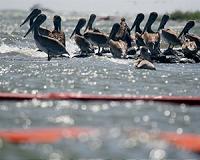 |
Niamey, Niger (UPI) Sep 30, 2010 The kidnapping of seven people, five of them French citizens, working in France's uranium mining operations in Niger has cast a pall over plans for 2,600-mile gas pipeline from Nigeria to Europe. The $15 billion Trans Sahara Gas Pipeline is one of Africa's most ambitious infrastructure projects. If completed, it would be the longest pipeline in the world, crossing one of the planet's most difficult environments, the Sahara Desert. But it has been plagued by problems almost since Nigeria, Niger and Algeria signed an agreement July 3, 2009, to build the pipeline to the Mediterranean Sea. The TSGP is designed to supply up to 1.06 trillion cubic feet of Nigerian natural gas a year to the European Union, which the bloc wants so it can reduce its dependence on Russian gas. But the EU has yet to put up any of the financing, which has caused delays. Several European energy giants, among them Royal Dutch Shell, ENI of Italy and Total of France, have expressed interest in buying into the project but none has fronted up with any money. The Niger kidnappings carried out Sept. 16 by al-Qaida of the Islamic Maghreb broke new ground for al-Qaida's North African franchise. The group, which is mainly comprised of Algerian jihadists, operated across the Sahara and the semi-arid Sahel belt to the south but had never before struck in northern Niger, a major uranium producer. This poses a major security problem for the project. The French declared war on AQIM in July after French and Mauritanian Special Forces troops attacked an AQIM camp in Mali, killing six militants. That was an apparent attempt to rescue a 78-year-old French hostage, who was beheaded by the jihadists two days later. Six weeks after that, AQIM struck in Niger, through which the pipeline will run. Niger also has trouble with marauding Tuareg rebels who have allied with AQIM in other regions. Together they would present a serious threat to the pipeline and the impoverished former French colony's uranium industry, its economic mainstay. The security problem is compounded by the likely resumption of an armed campaign against Nigeria's southern oilfields, including its pipeline network, by tribal insurgents led by the Movement for the Emancipation of the Niger Delta. They have called off a cease-fire with the government and threatened "all-out war" in a campaign that began in 2005 and slashed Nigeria's oil production from 2.6 million barrels per day by one-third. They have also threatened to attack the TSGP if the project gets off the ground. "In this context, it's hard not to take Mend's threats seriously as 1,037 kilometers (644 miles) of its track will run through Nigeria," the Jamestown Foundation, a Washington think tank that monitors global security, observed. "If government and private security forces are unable to protect the country's oil infrastructure the protection of a 1,037-kilometer-long pipeline will be even harder, affecting the costs and economic viability of the plan." Algeria, the northern end of the planned pipeline, is also engaged in fighting AQIM in the Saharan wastes. AQIM has hit economic targets, including oil installations, in the past and a new high-profile project like TSGP would be highly vulnerable. Guarding the hundreds of miles of pipeline that would run across the Sahara -- the longest leg of the project -- would be an impossible task. The ambitious project would enormously benefit Nigeria and Algeria in particular. But another problem is that it has recently lost two of its main champions, Nigeria's Energy Minister Rilwanu Lukman, and his Algerian counterpart, Chakib Khelil. Both lost their posts recently, Khelil in a purge that targeted Sonatrach, Algeria's state oil giant. The dismissal of Sonatrach's top managers in recent months, part of a power struggle between President Abdulaziz Bouteflika and Algeria's generals, has paralyzed the huge company. A new minister and Sonatrach management team has been appointed but the decision-making process regarding the TSGP and efforts to boost Algeria's gas production and exports has apparently stalled amid the political rivalries. The pipeline had been scheduled to become operational by 2015 but industry insiders say that now seems overly optimistic.
Share This Article With Planet Earth
Related Links Powering The World in the 21st Century at Energy-Daily.com
 BP fines should fund Gulf restoration, says report
BP fines should fund Gulf restoration, says reportWashington (AFP) Sept 28, 2010 President Barack Obama's pointman on restoring the oil spill-hit Gulf coast recommended Tuesday that the area's recovery by funded in part by fines levied against BP, which could run to the billions of dollars. The report presented by Navy Secretary Ray Mabus seeks to dedicate a portion of "any obtained Clean Water Act civil penalties directly to the Gulf states," in a bid to secure a st ... read more |
|
| The content herein, unless otherwise known to be public domain, are Copyright 1995-2010 - SpaceDaily. AFP and UPI Wire Stories are copyright Agence France-Presse and United Press International. ESA Portal Reports are copyright European Space Agency. All NASA sourced material is public domain. Additional copyrights may apply in whole or part to other bona fide parties. Advertising does not imply endorsement,agreement or approval of any opinions, statements or information provided by SpaceDaily on any Web page published or hosted by SpaceDaily. Privacy Statement |